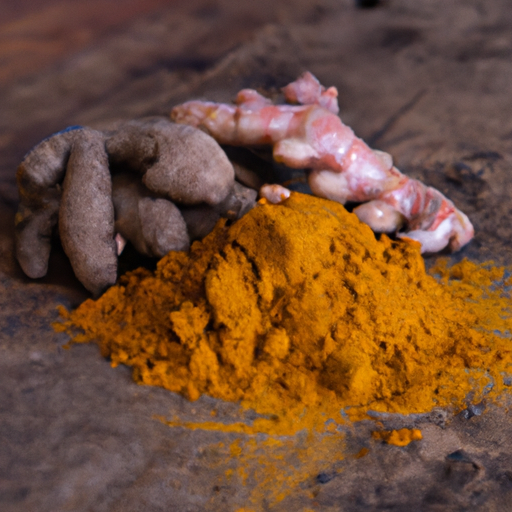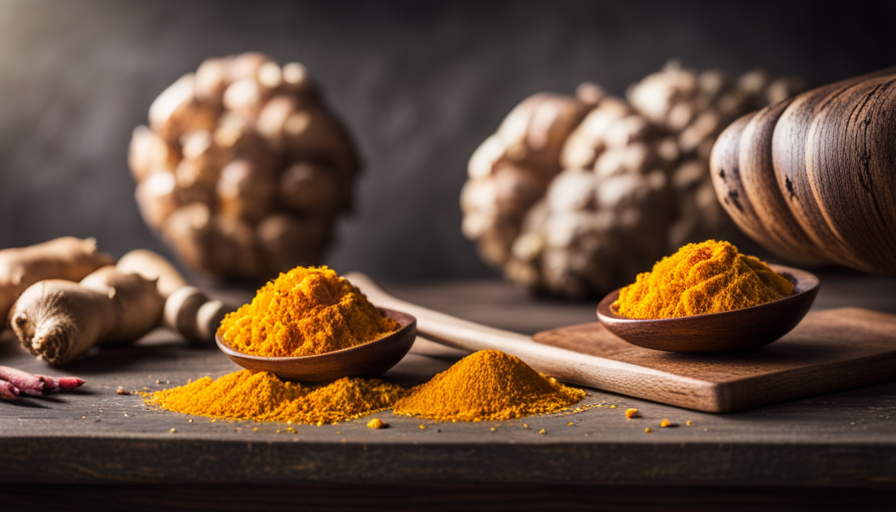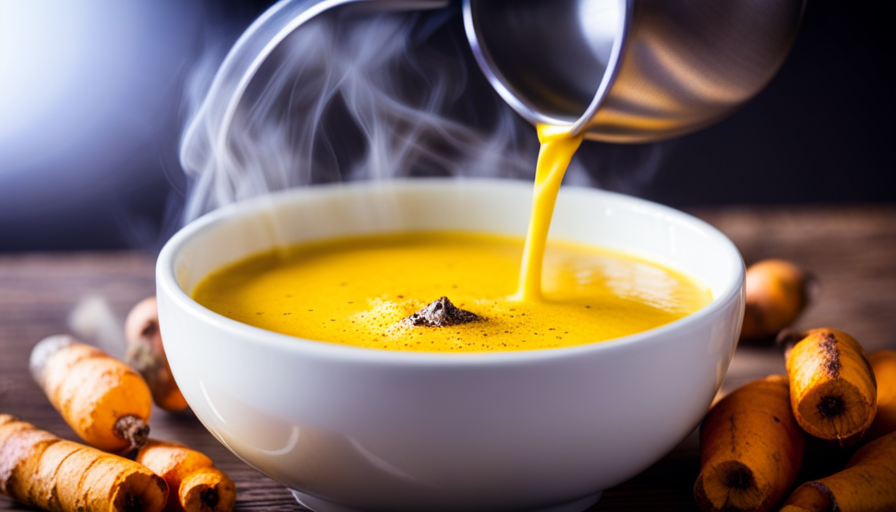You might be wondering, ‘Can you put milk in turmeric tea for inflammation?’ It’s a valid question, considering that traditional turmeric tea recipes often include ingredients like ginger, lemon, or honey. But what about milk?
Some may argue that adding milk to turmeric tea could dilute its potential health benefits. After all, turmeric contains a compound called curcumin, which has anti-inflammatory properties. So, wouldn’t the addition of milk decrease the curcumin’s effectiveness?
Well, let’s explore the scientific evidence. Studies have shown that the combination of milk and turmeric can actually enhance the absorption of curcumin in the body. The fat in milk can aid in the absorption of curcumin, allowing it to reach its full potential in reducing inflammation.
However, it’s important to consider a few factors when adding milk to turmeric tea. The type of milk, the ratio of milk to turmeric, and individual dietary restrictions should all be taken into account. Additionally, incorporating other ingredients like black pepper or cinnamon can further enhance the benefits of turmeric tea.
In this article, we’ll delve deeper into the potential health benefits of turmeric tea, discuss the scientific evidence on milk and turmeric, and provide personal experiences and testimonials. We’ll also highlight precautions and potential side effects to ensure you have all the information you need to make an informed decision.
So, let’s discover whether adding milk to turmeric tea can truly help alleviate inflammation.
Key Takeaways
- Adding milk to turmeric tea enhances the absorption of curcumin, the anti-inflammatory compound in turmeric.
- Different types of milk (cow’s milk, almond milk, coconut milk) have different taste and health benefits.
- Black pepper can increase the absorption of curcumin.
- Honey adds sweetness and provides antioxidant and antimicrobial properties to turmeric tea.
The Potential Health Benefits of Turmeric Tea
If you’re looking to soothe inflammation, you can add a splash of creamy milk to your warm turmeric tea, creating a golden elixir that gently coats your throat and warms your body from the inside out.
Turmeric tea, made from the root of the turmeric plant, has been used for centuries in traditional medicine for its potential health benefits. Not only is it a popular home remedy for inflammation, but it’s also known for its potential to aid in weight loss.
There are various turmeric tea recipes available that incorporate different ingredients, but adding milk to your tea can enhance its flavor and creaminess.
Now, let’s delve into the scientific evidence on the combination of milk and turmeric and how it may further enhance the benefits of this soothing elixir.
Scientific Evidence on the Combination of Milk and Turmeric
When considering the combination of milk and turmeric, it’s important to examine the scientific evidence on both turmeric’s anti-inflammatory effects and milk’s effects on turmeric’s bioavailability.
Studies have shown that turmeric contains compounds with anti-inflammatory properties. These compounds have been found to be effective in reducing inflammation in various conditions.
Additionally, research suggests that milk can enhance the bioavailability of turmeric. This allows for better absorption of its beneficial compounds.
Studies on Turmeric’s Anti-Inflammatory Effects
Mixing milk into your turmeric tea can enhance its anti-inflammatory effects, making it a soothing and delicious remedy for inflammation. Numerous studies have investigated the potential benefits of turmeric in reducing inflammation, particularly in relation to conditions such as cancer and arthritis.
Turmeric contains a compound called curcumin, which has been shown to possess powerful anti-inflammatory properties. In one study, curcumin was found to inhibit the activity of inflammatory enzymes and reduce the production of inflammatory molecules. Another study demonstrated that curcumin can suppress the activation of certain proteins involved in inflammation.
These findings suggest that incorporating turmeric into your diet, especially when combined with milk in the form of turmeric tea, may help alleviate inflammation. Moving forward, it’s important to explore the research on milk’s effects on turmeric’s bioavailability to fully understand its potential benefits.
Research on Milk’s Effects on Turmeric’s Bioavailability
Research has been conducted to investigate how milk affects the bioavailability of turmeric. This is an important consideration because turmeric’s potency and absorption can be impacted by the addition of milk. A study published in the journal Molecular Nutrition and Food Research found that the presence of milk significantly increased the bioavailability of curcumin, the active compound in turmeric. The researchers suggested that the fat content in milk may enhance the absorption of curcumin. However, another study published in the journal Food Chemistry found that certain proteins in milk can bind to curcumin, potentially reducing its bioavailability. These conflicting findings highlight the need for further research to fully understand milk’s effect on turmeric’s bioavailability. Considering these factors, it is important to carefully consider the addition of milk when preparing turmeric tea for inflammation.
Moving forward, it is important to explore other factors to consider when adding milk to turmeric tea without compromising its potential benefits.
Factors to Consider When Adding Milk to Turmeric Tea
When considering adding milk to turmeric tea, there are a few factors to take into account. Firstly, the type of milk you use can influence the taste and health benefits of the tea.
Secondly, the ratio of milk to turmeric tea is crucial in order to achieve the desired flavor and consistency.
Lastly, the best time to add milk to turmeric tea is after it’s been brewed and strained, allowing the flavors to meld together.
By considering these factors, you can create a delicious and nutritious cup of turmeric tea with milk.
Type of Milk to Use
To enhance the soothing properties of your turmeric tea, opt for a splash of creamy milk that will embrace the golden elixir like a warm hug. When choosing the type of milk to use, it is important to consider the benefits each option offers. Here is a visual representation of the different types of milk and their benefits:
| Type of Milk | Benefits |
|---|---|
| Cow’s milk | Good source of calcium and protein |
| Almond milk | Low in calories and high in vitamin E |
| Coconut milk | Rich in healthy fats and can boost brain function |
By adding milk to your turmeric tea, you can enjoy a combination of the anti-inflammatory properties of turmeric and the additional health benefits provided by the type of milk you choose. Now, let’s explore the ideal ratio of milk to turmeric tea for maximum effectiveness.
Ratio of Milk to Turmeric Tea
If you want your turmeric tea to reach peak deliciousness, finding the perfect ratio of milk to creamy goodness is key. The milk ratio can greatly affect the taste and texture of your turmeric tea. Adding milk not only enhances the flavor but also provides additional health benefits.
When it comes to the milk ratio, it’s recommended to add 1/4 to 1/2 cup of milk for every cup of turmeric tea. This ensures a creamy and satisfying beverage without overpowering the earthy taste of turmeric. The milk adds a smoothness to the tea and helps to balance the slightly bitter notes of turmeric.
Now that we have the milk ratio sorted, let’s move on to the best time to add milk, which can further elevate the taste and benefits of your turmeric tea.
Best Time to Add Milk
For the ultimate creamy and indulgent experience, imagine gently pouring a velvety stream of milk into your steaming turmeric tea, creating a luscious swirl of flavors and aromas.
The best time to add milk to turmeric tea is after the tea has steeped and before you drink it. This allows the milk to blend seamlessly with the tea, enhancing its taste and texture.
When it comes to alternative dairy options, you can also consider using almond milk or coconut milk instead of regular milk. These options not only add a unique flavor profile to your turmeric tea but also provide additional health benefits. Almond milk is low in calories and rich in vitamin E, while coconut milk is known for its creamy texture and medium-chain triglycerides that can boost brain function.
Adding milk to turmeric tea is a delightful way to enjoy this soothing beverage. But don’t stop there! In the next section, we’ll explore other ingredients to enhance the benefits of turmeric tea.
Other Ingredients to Enhance the Benefits of Turmeric Tea
When it comes to enhancing the benefits of turmeric tea, there are a few key ingredients to consider. First, adding a pinch of black pepper to your turmeric tea can increase the absorption of its active compound, curcumin, in the body. This can help maximize its anti-inflammatory effects.
Second, adding a teaspoon of honey not only adds a touch of sweetness, but also provides additional health benefits, such as antioxidant and antimicrobial properties.
Lastly, incorporating these ingredients into your turmeric tea can create a flavorful and holistic beverage that supports overall well-being.
Black Pepper for Increased Absorption
Wow, adding a pinch of black pepper to your turmeric tea is like unleashing an absorption superhero that ensures maximum benefits for your body. Here are four reasons why black pepper is a game-changer when it comes to increasing the absorption of turmeric in your tea:
-
Piperine, the active compound in black pepper, enhances the bioavailability of curcumin, the key component in turmeric, by inhibiting enzymes that break it down in the liver.
-
Studies have shown that combining black pepper with turmeric can increase curcumin absorption by up to 2000%.
-
Black pepper also possesses its own anti-inflammatory properties, which complement the benefits of turmeric in reducing inflammation.
-
The combination of black pepper and turmeric not only enhances absorption but also creates a synergistic effect, making them more powerful together than when consumed separately.
Now, let’s explore how adding honey to your turmeric tea can provide added flavor and health benefits.
Honey for Added Flavor and Health Benefits
Adding honey to your turmeric tea creates a deliciously sweet and nutritious combination that’ll leave you craving for more. Not only does honey enhance the flavor of your tea, but it also provides additional health benefits. Honey’s a natural sweetener that contains antioxidants and antibacterial properties, which can support your immune system and promote overall well-being. Moreover, honey alternatives like maple syrup or agave nectar can be used if preferred.
In Ayurvedic medicine, turmeric’s considered a powerful herb with anti-inflammatory properties. When combined with honey, the two ingredients work synergistically to provide a holistic approach to health and wellness.
As we transition to personal experiences and testimonials, you’ll discover how this simple addition of honey can make a significant difference in your daily routine.
Personal Experiences and Testimonials
I’ve personally tried adding milk to my turmeric tea and I’ve found it to be a beneficial addition. The combination of turmeric and milk creates a soothing and nourishing drink that can help reduce inflammation in the body.
Additionally, the milk adds a creamy texture and taste to the tea, making it more enjoyable to consume. Overall, incorporating milk into turmeric tea can be a great way to enhance its benefits and promote overall well-being.
Individuals Who Have Tried Milk in Turmeric Tea
Surprisingly, many brave souls have ventured to mix milk with turmeric tea in their quest to soothe inflammation. As someone who has tried this combination, I can share my personal experience. While some individuals with lactose intolerance may opt for milk alternatives like almond or coconut milk, I found that regular cow’s milk worked just fine for me. The creamy texture of milk adds a richness to the turmeric tea, making it more enjoyable to drink. In terms of different ways to consume turmeric for inflammation relief, mixing it with milk is just one option. Some people also add turmeric to smoothies, sprinkle it on roasted vegetables, or even incorporate it into salad dressings. Overall, I have found that incorporating milk into turmeric tea has been a delightful and effective way to harness the anti-inflammatory properties of turmeric. Moving on to the benefits or challenges experienced…
Benefits or Challenges They Have Experienced
If you’re looking to enhance your overall well-being, incorporating milk into your turmeric tea can provide a range of benefits or challenges worth considering.
Many individuals have shared their personal testimonials about the challenges they’ve faced when adding milk to their turmeric tea. Some have reported that the milk tends to dilute the flavor and intensity of the turmeric, making it less effective for inflammation relief. Others have experienced digestive challenges such as bloating or discomfort due to the combination of milk and turmeric. However, it’s important to note that these challenges may vary from person to person. It’s always best to listen to your body and make adjustments accordingly.
Now, let’s delve into precautions and potential side effects to further explore the use of milk in turmeric tea.
Precautions and Potential Side Effects
However, it’s important to note that adding milk to turmeric tea may not be suitable for those who are lactose intolerant, as it could potentially cause digestive discomfort. While milk can enhance the taste and provide additional nutrients, it is crucial to be aware of possible precautions and potential side effects.
Some individuals have reported experiencing bloating, gas, or diarrhea after consuming milk in combination with turmeric tea. These personal experiences and testimonials highlight the need for caution. Additionally, milk may reduce the absorption of certain beneficial compounds in turmeric, such as curcumin. Therefore, individuals who are lactose intolerant or have sensitive digestive systems should consider alternatives like almond milk or coconut milk.
In conclusion, understanding these precautions and potential side effects can help individuals make informed decisions when adding milk to turmeric tea.
Conclusion and Final Recommendations
To fully understand the potential benefits and drawbacks of adding milk to turmeric tea, it’s essential to consider the available research and consult with a healthcare professional for personalized recommendations.
While personal anecdotes may suggest that milk can enhance the taste and texture of turmeric tea, there’s limited scientific evidence to support its effectiveness in reducing inflammation. However, it’s important to note that turmeric itself has been shown to have anti-inflammatory properties.
If you’re lactose intolerant or prefer alternative milk options, such as almond or coconut milk, these can be viable alternatives to consider.
Ultimately, it’s best to listen to your body and make choices that align with your individual needs and preferences. Always consult with a healthcare professional to ensure you’re making informed decisions regarding your health.
Frequently Asked Questions
Can turmeric tea with milk help with weight loss?
Turmeric tea has several benefits, including potential weight loss support. While the question doesn’t mention milk, combining it with turmeric tea may create a tasty and nutritious beverage. Here’s a simple turmeric tea recipe to try.
What is the recommended dosage of turmeric tea with milk for inflammation?
The recommended dosage of turmeric tea with milk for inflammation varies depending on individual needs and health conditions. It is best to consult with a healthcare professional to determine the appropriate amount. Turmeric tea with milk has numerous health benefits.
Can adding milk to turmeric tea enhance its antioxidant properties?
Does adding milk to turmeric tea enhance its antioxidant properties? Yes, milk contains compounds like casein and whey protein that can increase the bioavailability of turmeric’s active compound, curcumin, thus enhancing its antioxidant benefits.
Does the type of milk used in turmeric tea affect its effectiveness for inflammation?
The choice of milk in turmeric tea can affect its effectiveness for inflammation. Studies suggest that adding milk high in fat can enhance turmeric absorption, leading to better anti-inflammatory effects.
Are there any potential interactions between turmeric tea with milk and certain medications?
Potential interactions between turmeric tea with milk and certain medications may occur. It is important to consult with a healthcare professional to determine if it is safe to consume turmeric tea with milk while taking specific medications.
Conclusion
In conclusion, after examining the potential health benefits of turmeric tea and the scientific evidence on the combination of milk and turmeric, it’s evident that adding milk to turmeric tea can enhance its anti-inflammatory properties. However, it’s important to consider individual factors and preferences when making this decision.
Additionally, incorporating other ingredients like black pepper or ginger can further enhance the benefits of turmeric tea. While personal experiences and testimonials can provide insight, it’s crucial to approach them with caution.
Overall, turmeric tea with milk can be a valuable addition to a holistic approach towards reducing inflammation.










